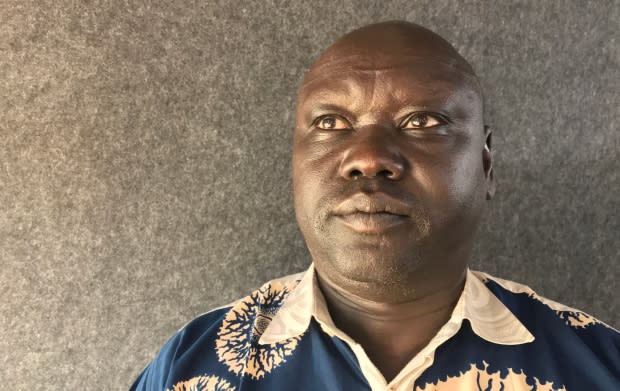Opposition rep urges support for South Sudan peace agreement
Stephen Par Kuol is travelling the world urging people to support a peace agreement signed last month to end the five-year-old civil war in South Sudan.
Kuol is chairman of the National Committee for Foreign Relations for the Sudan People's Liberation Movement in Opposition and says hundreds of thousands of people have been killed and millions displaced after South Sudan gained independence seven years ago.
He is speaking with Sudanese communities living outside South Sudan, including Calgary and Edmonton. He shared his message with The Homestretch. Alberta has the largest South-Sudanese population in Canada.
This interview has been edited and paraphrased for clarity and length. You can listen to the complete interview here.
Q: Why did you come all the way to Calgary to share what is happening in Sudan?
A: We have just signed a peace agreement on Sept. 12 in the capital of Sudan, Khartoum, with the two warring parties of South Sudan and we need our people to be informed about it.
We have been at war since December 2013. We signed an agreement in August 2015 that collapsed months later.
We have difficulties now implementing the agreement but I want to rally our people behind the peace process. I am also challenging the international community to come in and support the implementation and hold the parties accountable to the agreement.
Q: What has been going on in South Sudan for several years now? A: It happened in December 2013, barely two years after we became independent from the Republic of the Sudan.
The current dictator we have in power accused his political opponents of a military coup that did not actually happen.

Then massacres and atrocities were carried out. Then there was an uprising in the country.
The factions of the opposition transformed the uprising into a political program and we formed this party, this liberation movement called SPLM and SPLA (Sudan People's Liberation Army).
Q: Have many lives have been lost?
A: About 500,000 people have died so far. This situation is still very dire.
A humanitarian crisis has engulfed the country. Our people have been displaced from their homes.
We have large numbers of refugees in neighbouring countries, Uganda, Kenya, Ethiopia, Sudan.
We also have internally-displaced people. Our people live in United Nations mission camps, even in their own capitals.
People are living in fear. There is a security crisis all over the country after the genocide that was carried out.
Q: Do you have confidence this latest peace agreement is going to be enforced? A: We have terrible experience with implementation of peace agreements. That has caused doubt in the minds of so many people.
The regime in Juba has detained so many people in a national security detention centre. They have been detained for years without trial. We are demanding the release of so many people.
Q: What feedback are you getting in Alberta?
A: Some of them express doubt, some are optimistic.
To me, it should be a collective work of the people. I want our people, the churches and the citizens of South Sudan to throw their weight behind these agreements and telling the political parties to implement them.
Q: What do you hope to achieve with your visit?
A: It is supposed to be a time for dialogue.
Without dialogue, you cannot achieve peace. Many of our people here are stakeholders in the peace process. They still have family in the country.
Q: What impact does social media have on politics there?
A: Social media has been very central to these conflicts and it's been abused also by our people to fuel the war.
There are now hiccups in the reconciliation process and it has to do with what people say on social media.
With files from The Homestretch

